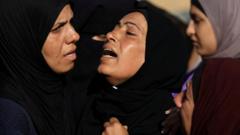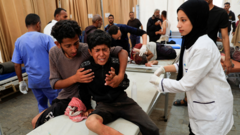Recent Israeli fire and air strikes have resulted in the deaths of at least 33 Palestinians, including 11 seeking food assistance, amplifying the humanitarian crisis in Gaza where over 140 fatalities were reported in just 24 hours. Criticism has mounted against the distribution of aid amidst ongoing violence.
Humanitarian Crisis Deepens as Israeli Strikes Claim Lives of Civilians in Gaza

Humanitarian Crisis Deepens as Israeli Strikes Claim Lives of Civilians in Gaza
Ongoing conflict in Gaza leads to substantial civilian casualties amidst desperate calls for aid.
In Gaza City, the death toll continues to rise as violence escalates. On Wednesday, independent rescuers reported that eleven Palestinians, among at least 33 total fatalities caused by Israeli gunfire and air strikes, were killed while seeking aid. The Hamas-run civil defense agency stated that Israeli forces "opened fire and launched several shells" at thousands of people lining up for food supplies on the busy Salah al-Din Road.
The Israeli military claimed it had fired warning shots in response to perceived threats from a gathering crowd but denied knowledge of any injuries. In addition, another 19 fatalities were reported from Israeli air strikes across Gaza, with eight casualties occurring from a strike on a home in the Zeitoun area of Gaza City. The Israeli military indicated these operations were aimed at dismantling Hamas’ military capabilities.
The situation remains dire, as Gaza's Hamas-run health ministry reported that at least 140 individuals have lost their lives across the region within the prior 24 hours. A separate incident in Khan Younis saw 51 people killed while waiting for aid, with UN health partners placing the death toll there at over 60. Eyewitnesses confirmed that Israeli tanks and drones opened fire on crowds near a UN World Food Programme warehouse.
The ongoing violence has sparked ongoing criticism of the new aid distribution system being employed by the U.S.-backed Gaza Humanitarian Foundation (GHF), which aims to deliver supplies while bypassing the UN. This approach has been denounced by humanitarian organizations that argue it undermines essential principles of neutrality and independence. Reports indicate that nearly 400 people have been killed since GHF began operations in May, highlighting the perilous conditions surrounding aid access in Gaza.
On Wednesday, Philippe Lazzarini, the head of the UN agency for Palestinian refugees (UNRWA), condemned the aid distribution methods as "lame, medieval, and lethal," urging accountability for those responsible. The GHF defended its actions, announcing that it has successfully distributed 30 million meals without incident.
The World Food Programme has raised alarms over the critical food shortages, stating that the 9,000 tonnes of aid it recently supplied is merely a small fraction of what is needed. The organization cautioned that mounting desperation is prompting large crowds to form along transport routes in hopes of intercepting aid shipments.
In an effort to address the dire needs, the Israeli military reported that 85 truckloads of aid entered Gaza on Tuesday, while another 380 were waiting for collection. However, humanitarian groups are warning that only a significant increase in food distributions can help stabilize the situation, calm anxieties among the population, and restore trust in aid delivery.
This ongoing conflict follows a Hamas-led attack on southern Israel on October 7, 2023, which resulted in a tragic loss of life. The health ministry of Gaza claims that at least 55,637 individuals have been killed since hostilities escalated, marking a sobering chapter in the Israeli-Palestinian conflict.





















